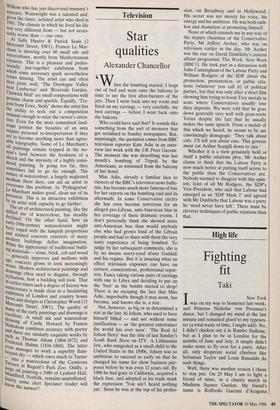Television
Star qualities
Alexander Chancellor
When the bombing started, I leapt out of bed and went onto the balcony in time to see the first after-burners of the jets. Then I went back into my room and fixed on my earrings — very carefully, my best earrings — before I went back onto the balcony.'
Who could have said that? It sounds like something from the sort of memoirs that get serialised in Sunday newspapers. But, surprisingly, the quotation comes from BBC television reporter Kate Adie in an inter- view last week with the UK Press Gazette. The moment she was describing was last month's bombing of Tripoli by the Americans, as witnessed from the balcony of her hotel.
Miss Adie, already a familiar face to viewers of the BBC's television news bulle- tins, has become much more famous of late for her reports on the bombing raid and its aftermath. In some Conservative circles she has even become notorious for an alleged pro-Libyan, anti-American bias in her coverage of these dramatic events. I don't personally think she showed more anti-American bias than would anybody else who had grown fond of the Libyan people and had to share with them the very nasty experience of being bombed. To judge by her subsequent comments, she is by no means starry-eyed about Gaddafi and his regime. But it is amazing what an effect television exposure can have on earnest, conscientious, professional repor- ters. Fancy taking various pairs of earrings with one to Libya and deciding to put on the 'best' as the bombs started to drop! There is no escaping the fact that Miss Adie, improbable though it may seem, has become, and knows she is, a star.
Not, however, as big or as determined a star as the late Al Jolson, who used to have himself billed — and not without some justification — as 'the greatest entertainer the world has ever seen'. 'The Real Al Jolson Story' was the title of last Sunday's South Bank Show on ITV. A Lithuanian Jew, who emigrated as a small child to the United States in the 1890s, Jolson was so ambitious to succeed so early on that he changed his name for show business pur- poses before he was even 12 years old. By 1906 he had gone to California, acquired a black face, and adopted as his trade mark the expression 'You ain't heard nothing yet.' Soon he was at the top of his profes- sion, on Broadway and in Hollywood. His secret was not merely his voice, his energy and his ambition. He was both ruth- less and shameless at promoting himself.
None of which reminds me in any way of the deputy chairman of the Conservative Party, Mr Jeffrey Archer, who was on television earlier in the day. Mr Archer was the star on David Dimbleby's current affairs programme This Week, Next Week (BBC1). He took part in a discussion with John Cunningham of the Labour Party and William Rodgers of the SDP about the promotion, presentation, or public rela- tions (whatever you call it) of political parties, but that was only after a short film showing him trying to boost Tory morale in seats where Conservatives usually lose their deposits. We were told that he goes down generally very well with grass-roots Tories despite the fact that he usually makes the same speech. From a snatch of this which we heard, he seems to be un- convincingly demagogic: `They talk about cuts. I'll tell you about cuts. This govern- ment cut Arthur Scargill down to size.'
Whether it is a view genuinely held or itself a public relations ploy, Mr Archer claims to think that the Labour Party is now much better at putting itself across to the public than the Conservatives are. Nobody seemed to disagree with this opin- ion, least of all Mr Rodgers, the SDP's Vice-President, who said that Labour had emerged as an `SDP Mark 2' and agreed with Mr Dimbleby that Labour was a party he 'need never have left'. There must be cleverer techniques of public relations than that.


























































 Previous page
Previous page